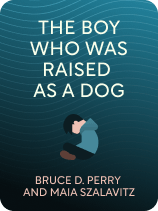

This article is an excerpt from the Shortform book guide to "The Boy Who Was Raised as a Dog" by Bruce D. Perry and Maia Szalavitz. Shortform has the world's best summaries and analyses of books you should be reading.
Like this article? Sign up for a free trial here.
What are the consequences of infant neglect? How does a lack of physical affection impact development?
Infant neglect, such as the deprivation of touch, prevents a baby from developing a healthy stress response system and can even stunt physical development. Understanding how this works gives you great insight into a baby’s needs.
Learn from this case study about the importance of physical touch and care for infants.
The Effects of Touch Deprivation in Infancy: Laura’s Case
Infant neglect, such as deprivation of physical stimulation in infancy, can have a major impact on infants’ physical development. As mentioned earlier, physical touch is initially stressful for infants, as it’s a sensation they’re not used to. In order to properly develop their stress response systems and make touch less stressful and ultimately soothing, infants need a great deal of loving physical touch. The stress response has a direct impact on the body’s hormone regulation, so a lack of touch can inhibit the release of growth hormone and stunt physical growth—a condition called “failure to thrive,” or the inability to develop physically despite receiving sufficient calories and nutrients.
This was the case with Laura, a four-year-old who weighed just 26 pounds when Perry met her. (Shortform note: For context, the average weight for a healthy four-year-old is about 40 pounds.) In talking with Laura’s mother Virginia, Perry discovered that the woman had no knowledge or experience of loving, attentive care herself, and she simply didn’t know that she needed to hold her baby during feeding, rock her when she cried, and so on. Laura’s stress response systems weren’t developing properly due to lack of physical touch, and as a result, her body wasn’t producing enough growth hormone, so it couldn’t develop or grow. Once Virginia learned to provide this vital stimulation, Laura began thriving.
(Shortform note: Research suggests that physical touch is so vital to our ability to thrive that infants will die if they’re not touched enough. Some children are able to overcome it, as Laura did. But for others, touch deprivation at an early age can have lifelong consequences. Children deprived of touch in infancy often grow up to have cognitive deficits, neurological impairments, and emotional and behavioral problems. Adults who were deprived of touch at an early age are more likely to be aggressive and to struggle with substance abuse problems and suicidal tendencies. )

———End of Preview———
Like what you just read? Read the rest of the world's best book summary and analysis of Bruce D. Perry and Maia Szalavitz's "The Boy Who Was Raised as a Dog" at Shortform.
Here's what you'll find in our full The Boy Who Was Raised as a Dog summary:
- How trauma impacts the developing brains of children
- Case studies of child abuse and neglect, as told by a child psychiatrist
- An explanation of the Neurosequential Model of Therapeutics






